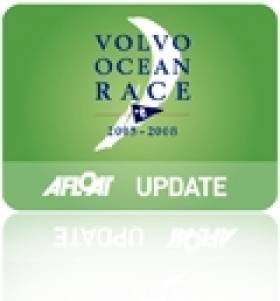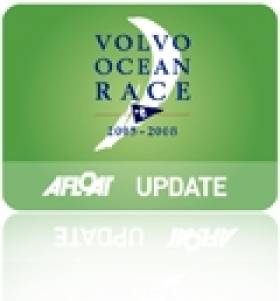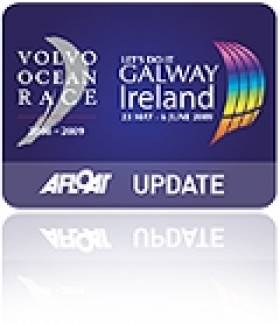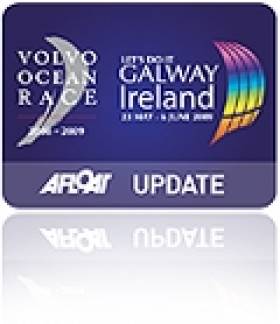Displaying items by tag: Team Sanya
VOR Update: Sanya Back On Route, Assembly Time For VOR 65
#VOR - The Chinese port of Sanya is the latest addition to the route for the next Volvo Ocean Race.
The sunny city in southern China - and the "best kept secret in sailing" according to Volvo Ocean Race CEO Knut Frostad - returns to the race with previously announced addition Lisbon after its debut hosting in the 2011-2012 edition,
"We were given an exceptional welcome by Sanya in the last edition, with the stopover providing a unique take on the race, and it's gratifying to know we will be back to build on our legacy," said Frostad.
Sanya also fielded a team backed by Discover Ireland in the last edition of the global yachting challenge - though they dealt with some misfortune only hours into the first leg of the race, suffering very serious hull damage as seen HERE.
Meanwhile, progress on the new design VOR 65 that will be raced in the 2014-15 Volvo Ocean Race made a great leap forward this week as the hull completed at Persico in Italy and the decking built at Multiplast in France made their way to Green Marine in Southampton for assembly.
The video above also includes a sneak peak at a mockup of the completed design that will hopefully take to the water in the coming months.
VOR Second Leg Cut Short Over Piracy Concerns
#VOLVO OCEAN RACE - The second leg of the Volvo Ocean Race from Cape Town to Dubai has been cut short by organisers as a result of the growing threat of piracy in the Indian Ocean, The Irish Times reports.
The six yachts competing will be protected by armed guards as they are shipped on a secret route to the United Arab Emirates due to piracy concerns.
The boats will be transported by ship from an undisclosed location to Sharjah in the Arabian Gulf, from where they will sprint to the finish line in Abu Dhabi.
All six teams are currently in Cape Town, with Team Sanya, PUMA and Abu Dhabi Ocean Racing hoping to get back in the race after retiring in the first leg.
As previously reported on Afloat.ie, NATO recently foiled a pirate attack on a Spanish fishing vessel between the Seychelles and the Somali coast.
The Irish Times has more on the story HERE.
Team Sanya Take 4th Place In The First In-port Race
The day started with rain and gusty wind but that did not deter the teams, guests and fans to support the boats as they left the dock in Alicante at 1130am this morning. By the time racing was ready to get going the breeze had died to around 8 knots northerly providing testing conditions for all.
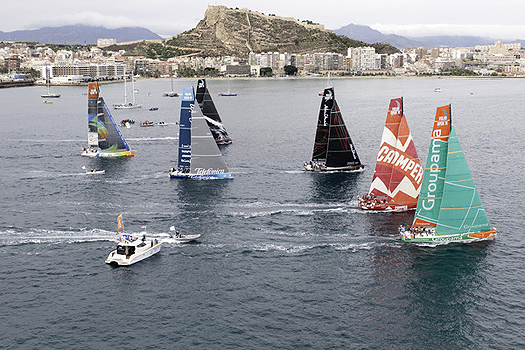
Photo: Paul Todd/Volvo Ocean Race
The race got underway on time with Abu Dhabi high and fast off the line and moving into immediate control of the race which they went on to win comfortably. At the first mark, Abu Dhabi led around followed by Camper, Puma, Groupama and a bit of a gap to Telefonica and Team Sanya. Team Sanya managed to overtake Telefonica down the first downwind leg moving into 5th.
The boats then headed up to the windward leg on a tight fetch where the wind died completely and brought in a number of shifts. Camper were the first to struggle and dropped from 2nd to last place momentarily. Team Sanya moved up to 3rd and all was looking very exciting. The teams then had to gybe back to reach the gate with Abu Dhabi getting around cleanly and heading to the finish with pace.
The rest of the fleet closed up on each other making for exciting viewing and the final downwind leg to the finish was nail biting to the end with Telefonica incurring a penalty and so the finish places ended up as:
1st Abu Dhabi Ocean Racing
2nd Puma Ocean Racing
3rd Camper Emirates Team New Zealand
4th Team Sanya
5th Groupama
6th Telefonica
Irish Sailors Get Ready for First VOR In-Port Races
The first of the in-port races ahead of the Volvo Ocean Race start tomorrow in Alicante – and top Irish sailors are among the six teams competing.
Wexford’s Justin Slattery is on Abu Dhabi Ocean Racing, which is competing in the race for the first time.
Skipper Ian Walker told Sail World: "Everything is ready and we can’t wait to line up against the other teams... The forecast is for strong breeze on Saturday so there will be extra pressure on the crew to get it right."
The team has another Ireland connection in its commercial director David Hassett, a veteran of the Irish yachting scene and backer of Ireland's Green Dragon team in the 2009 race.
Elsewhere, Kerryman Damian Foxall is a watch leader on Groupama, captained by debuting VOR skipper Franck Cammas - who last month received one of France's most prestigious sporting honours.
Meanwhile, the Chinese entry Team Sanya, which is part sponsored by Discover Ireland, is hoping skipper Mike Sanderson - who took Telefónica Blue to the podium at every stage in the 2009-09 race - can repeat his past successes.
In-port races take place in all 10 host ports along the 39,000-nautical-mile route, and as they account for more than 20% of the points, no team will be taking them easy.
As previously reported on Afloat.ie, a delegation from Galway - hosts of the final stage of the race next summer - will be in Spain for a week of events beginning tomorrow ahead of the start of the race proper on 5 November.
Sail World has more on the story HERE.



























